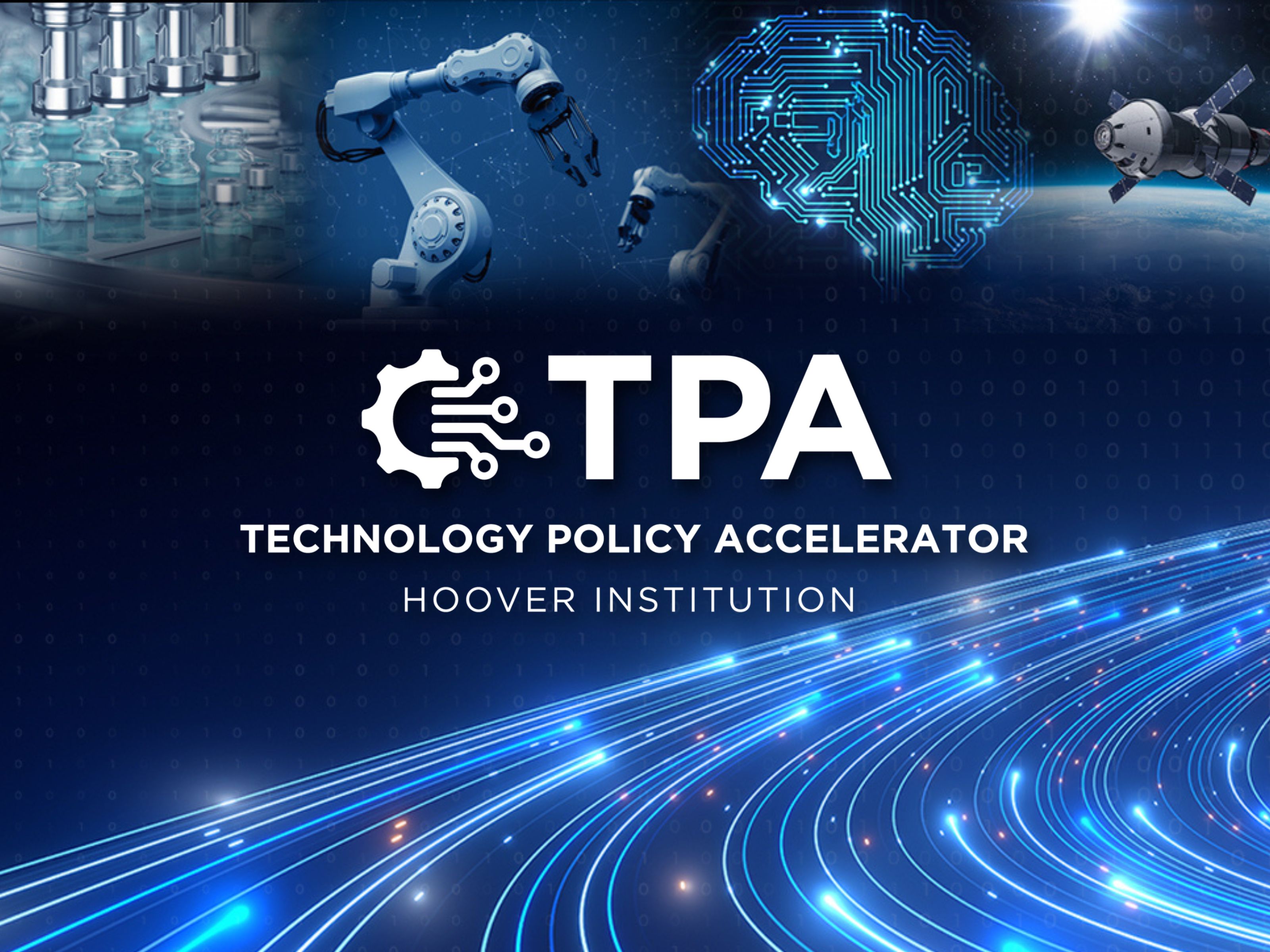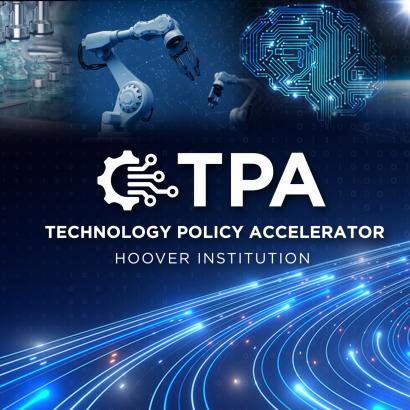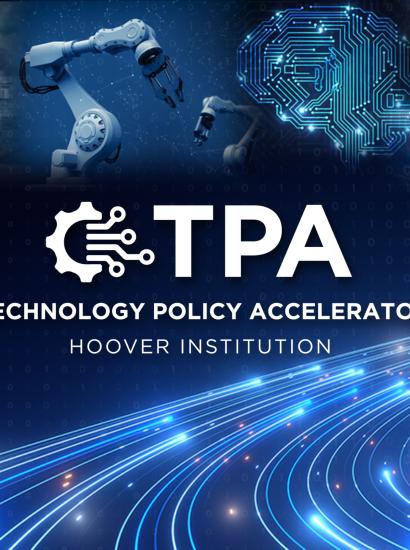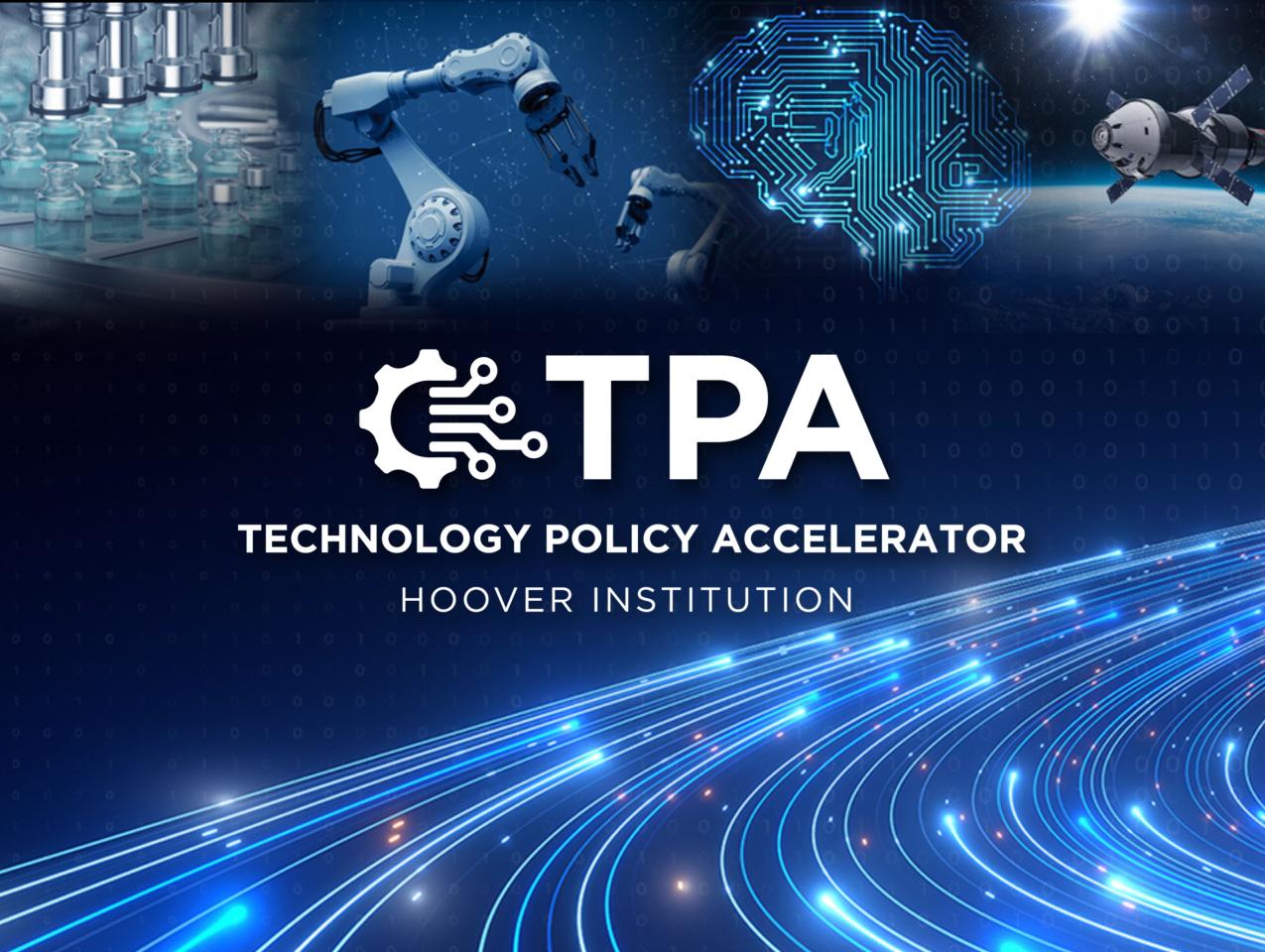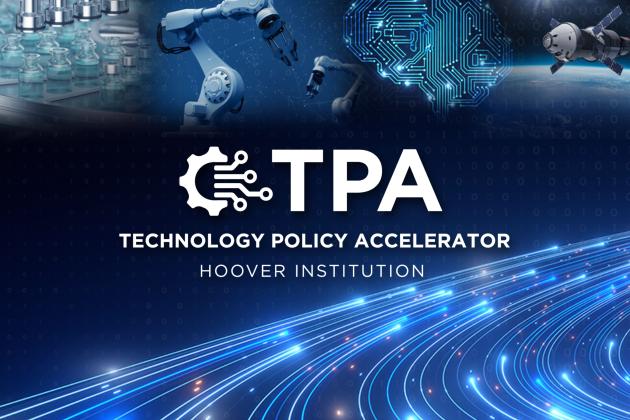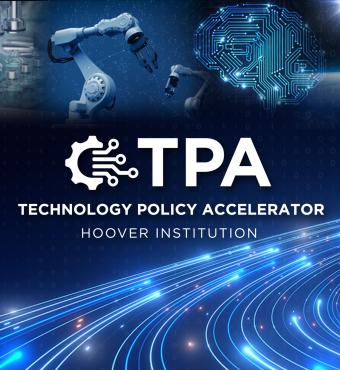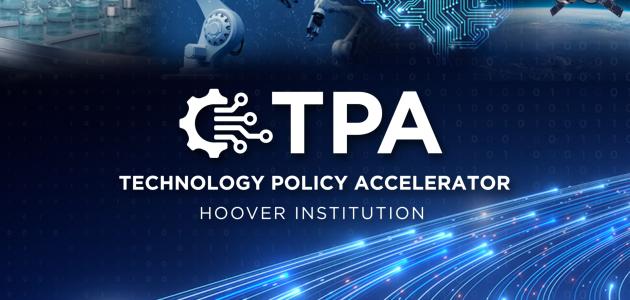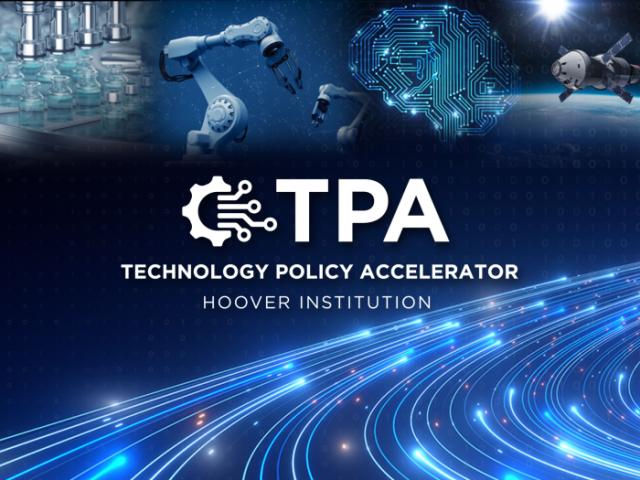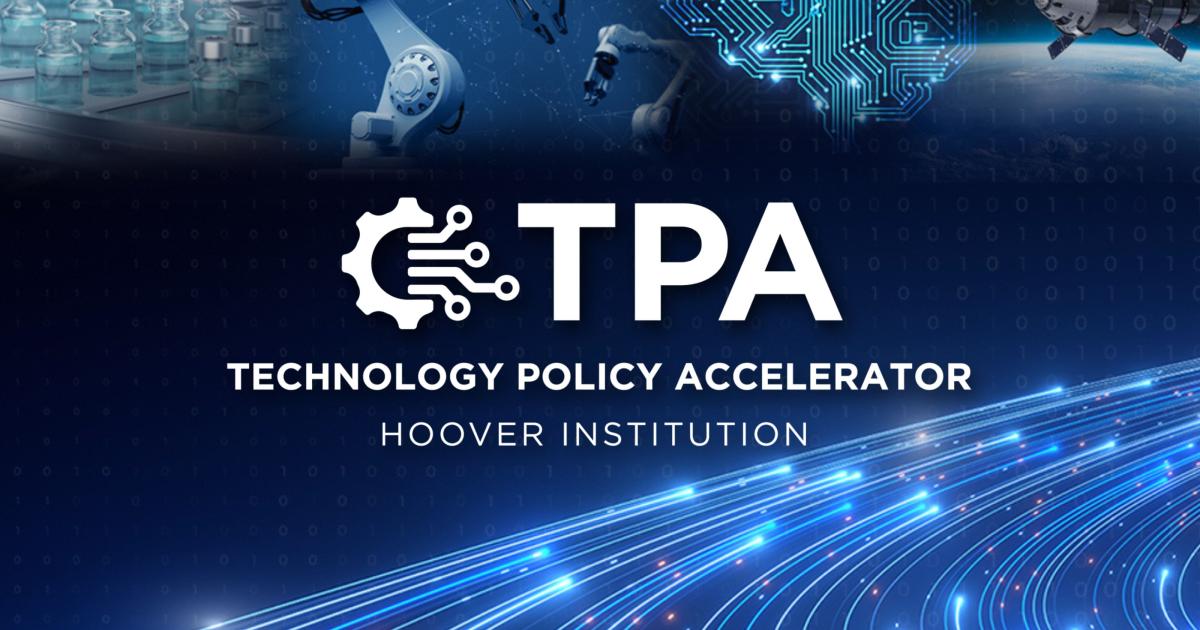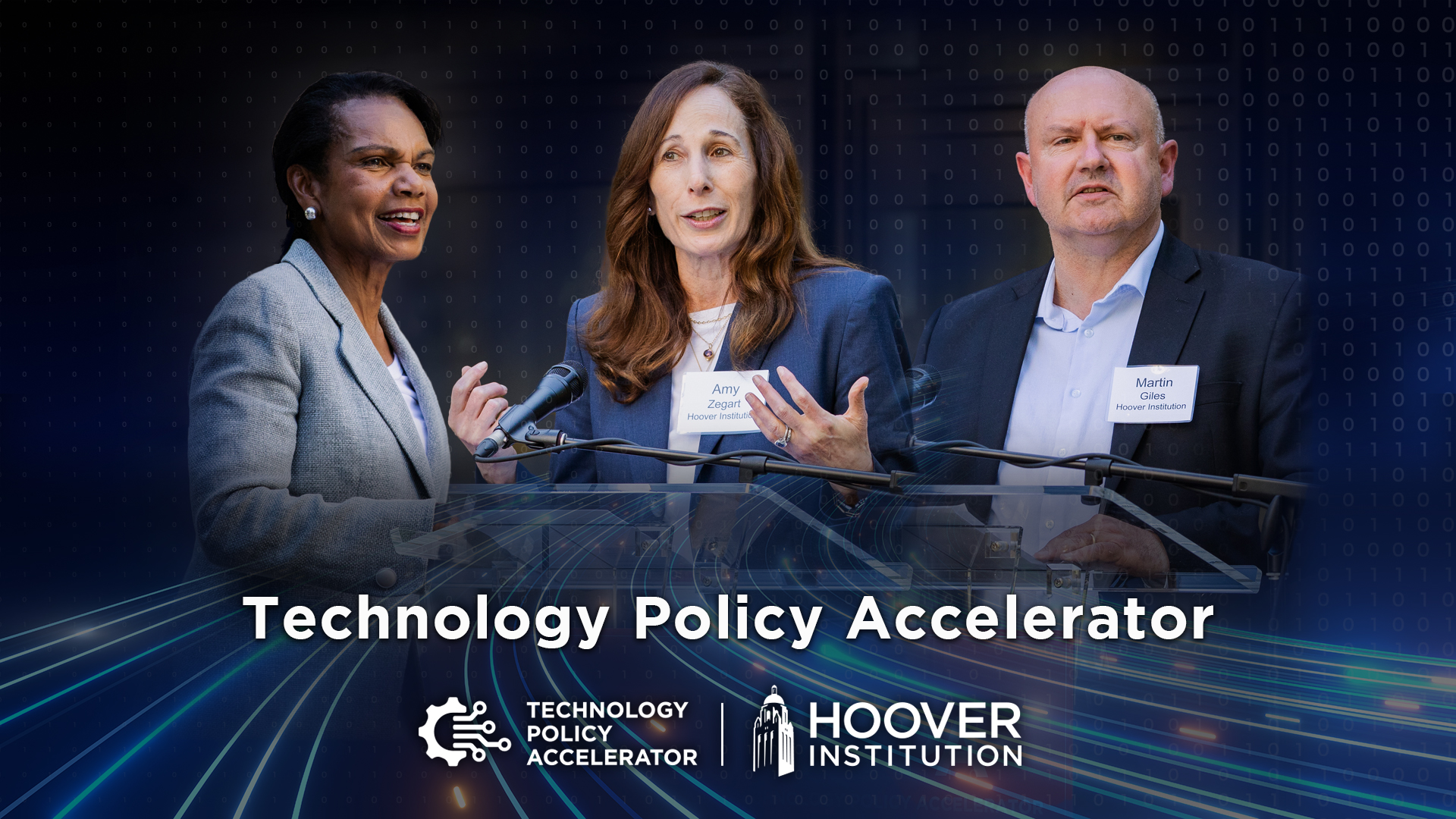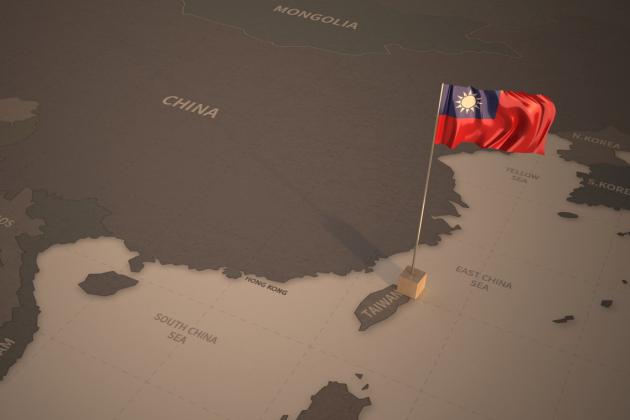On June 16, the Hoover Institution officially launched the Technology Policy Accelerator (TPA), a bold new initiative aimed at helping US government and business leaders navigate the rapidly evolving landscape of emerging technologies and their implications for national security, economic growth, and global leadership.
This event featured remarks from Condoleezza Rice, Hoover Institution director and former secretary of state; Amy Zegart, Hoover senior fellow and director of the TPA; and Martin Giles, assistant director of the TPA, as well as attendee engagement and technological demonstrations from the launch event.
The TPA’s mission is to support more informed policymaking by producing insights that clarify how emerging technologies are reshaping geopolitics, society, and the economy. It operates as a collaborative hub—connecting Silicon Valley and Washington, academia and industry, and science and strategy—to foster dialogue and advance understanding across sectors.
>> Martin Giles: Good evening, everybody. My name is Martin Giles and I am the Assistant Director of the Hoover Technology Policy Accelerator. It's so great to see all of you in this beautiful setting at the Hoover Institution now as you made your way through Stanford's campus today. And I'm told that one of the things we must do at the Hoover Technology Policy Accelerator is create a parking app as soon as possible.
So I do apologise, those of you had a little bit of parking trouble. You may have seen people taking down tents and awnings, and folding up chairs and tables. And that's because this weekend was the 134th commencement here at the university, when new graduates celebrate their achievements and look towards the next phase of their lives and and how they'll make an impact on the world.
Now, this evening's reception is a little like a commencement ceremony for us too. We'd love to share with you the thinking behind this relatively new Hoover initiative to reflect on what we've achieved so far and to highlight some of the exciting things that we've got planned in the months ahead.
And one of our most important goals is to make Hoover a vibrant community and a convening hub for all of the constituents of America's dynamic ecosystem and entrepreneurial ecosystem which is so essential to advancing our freedom and prosperity. What you all represent is everything that makes Silicon Valley such a unique and special place.
Here tonight we have top scholars working on cutting edge research in areas such as biotechnology, energy and neuroscience. We have entrepreneurs and executives building and leading companies in many frontier fields, from quantum tech to space tech and from AI to robotics. We have leaders from top law firms and PR firms.
And we have investors from many venture capital companies and private equity firms. Now, we know Monday is partner meeting day in many VC firms, and I know personally experienced those can get pretty heated sometimes. And so we thought you might appreciate one of our delicious accelerator cocktails or the non alcoholic TPA twist, if you have to, to cool you down into the evening.
Joking aside, we are thrilled so so many of you could be here this evening to hear what we're doing at the Technology Policy Accelerator. I'm also delighted to welcome representatives from the diplomatic community here in the Bay Area. And of course, I would be remiss if I didn't thank Animau, our four legged robot, and all of the postgrad docs who are here helping us display the amazing technologies that are being developed at Stanford.
Now I'd like to introduce the first of our two speakers this evening, Condoleezza Rice. Secretary Rice was the 66th Secretary of State, and she is the Tad and Diane Tobey, Director of Hoover and is the co chair of the Stanford Emerging Technology Review, which is part of the accelerator's portfolio of activities.
Please welcome Secretary Rice.
>> Condoleezza Rice: Thank you so much, Martin. It has been really a joy to see all of you here. I think this is just a great moment for, for the Stanford community and for the Silicon Valley community. I had a chance to be approached by the robot, which I wondered, was it a friendly robot?
Apparently it was. So I hope you've had a chance to see what some of our great postdoctoral fellows are able to do. This is just an extraordinary time in the history of a country and the history of the world and in terms of the transformational technologies that are really shaping the environment now and will shape it for years and years to come.
And that is why we believe that this is a perfect time to launch the Huber Technology Policy Accelerator to help business and government leaders better understand emerging technology and the geopolitical implications so that they can seize the opportunities while mitigating the risk, but making certain that we actually do seize the extraordinary opportunities that these technologies provide.
I personally think about the geopolitical aspects of this, but of course, whether it is in education or medicine or industrial productivity, these technologies are going to have a huge impact on our future. I want to tell you a little bit about the origin story of tpa. It was several years ago when Senator Mark Warner came to visit and we put together here at Hoover, drawing on our friends from across the campus in the sciences and engineering.
We put on a kind of event for him where he sat in kind of one place and listened to the scientists at the frontiers of these technologies. And at the end of it, he said, but how do I continue to do this? How do I keep up? Because this is all changing so fast.
It was at that time that Amy Sigart, who I'll introduce in a minute, had a kind of aha moment about the special role that the Hoover Institution could play as a convening institution. We are, for the most part, not scientists, but we have begun to borrow scientists from engineering and from the sciences because we're fortunate enough to sit here on a campus where we can walk 15 minutes to the best computer scientists in the world, another 15 minutes to the best bioengineers, where if we want someone to talk about privacy issues and technology, we can walk to the law school, we can walk to the business school, or to the medical school.
Senator Stanford, when he created and founded Stanford University, gave us a Great gift of this land that allowed us all to be co located. And then of course, what he could never have known was that Stanford would then be co located in the hub of innovation in the country and in the world here in the Silicon Valley.
And so this is in many ways we believe, the perfect place to bring together all of these elements, the private sector, the public sector, the scientific sector here at the university, to face the challenges and the opportunities before us. The this is really science first for us because we believe that if you understand the science, if you are willing to really think about its possibilities, you'll be better policymakers.
And so I want to recognize that this is a partnership with the School of Engineering. And I want to ask Dean Whittam to wave her hand here. Jennifer Whittam, 100th anniversary of the School of Engineering and Jennifer and I sort of started out on the journey, journey together for the Stanford Emerging Technology Review.
And without her, and without that leadership, it wouldn't be possible. So Jennifer, thank you. Now, why an accelerator? Well, we think that has connotations to you in the VC community. To accelerate new research and thinking on important tech policy issues that are shaping the face of America and the future of the international system.
To accelerate connectivity with Silicon Valley community through gatherings like this one and between the Silicon Valley and Washington D.C. one of the things that we have done in what has become the TPA is we have conducted what we call track twos between Washington and the Silicon Valley. Now, that term may not be familiar to everybody, but I'm a specialist in international politics.
And a track two is, is when you get people together from, let's say the old Soviet Union in my day who were not in government, they'd been in government with people in the United States who had been in government, and they would get together to talk about issues that would be hard to talk about when you were actually in government.
The funny thing about it is mostly they didn't speak the same language. And we happen to think that sometimes the Silicon Valley in Washington D.C. don't speak the same language. And so part of our goal is to bring those together. But I want to say that this is especially an important time because I'm concerned about a lot of what I see.
But the thing I'm most concerned about is whether the 80 year long commitment to scientific research, to biomedical research that has been done in American universities since a man named Vannevar Bush came up with a really brilliant idea, which was that the innovation ecosystem of the United States of America would be universities which would do the fundamental research that would lead to ever greater outcomes for humanity, that would lead to ever greater outcomes for prosperity and for the economy.
And whether here at Stanford, it was a double helix in DNA or stem cells or transistors, if you were HP or Google, that would come out of here. I think it's a tremendous story of innovation in these universities. We've got to get that story out, because in Washington and in other places, I'm not sure it's fundamentally understood.
I do think if we can just remind people what the world would look like without scientific research, without engineering research, without biomedical research, we would win that day. We would win that argument. But we've got a task ahead of us because not everybody understands it. And what I have been saying to friends in D.C. is there is no plan B.
The plan B is not the commercial sector, which you'll never find anybody who's more capitalistic than I am. But we want fundamental research with people who just get up in the morning and think. I think I'd like to understand why that does what it does. And that is the animating incentive to people in universities who have created all of this great research.
And so could not be a more important time to defend the role of universities, to defend the role of innovation, to defend the institutions that have made the United States the envy of the entire world when it comes to innovation and from research. In that regard, I want to introduce two people, or welcome two people who spend a lot of their time thinking about that.
David Studdard, our Dean of Research. David, please wave your hand and let's give him a hand. And then our provost, Provost Jenny Martinez, who I know spends a lot of time on these issues. So thank you, Jenny, David, for being here with us today. So I'm now going to turn it over to Amy, who has a few remarks so that you can get back to at least the mocktails, if not the cocktails.
So, Amy, please join me.
>> Martin Giles: It's always a horrible thing to come after Condi Rice. So she said, I had the aha moment. She's the accelerator in the Tech Policy accelerator. So join me in thanking her for making all of this possible. I couldn't be more delighted to lead the Tech Policy Accelerator.
And I want to be brief because the goal today is for you to meet each other. And we have some homework for you. You thought it was a free mocktail. It's not a free mocktail. This is the first of what we hope will be quarterly gatherings. We recently had a meeting with our British Counterparts and diplomats with CEOs and academic experts.
And as we were having cocktails right here, many people said, you know, we should do this more often. So we're going to do this more often. And the idea is to have fun gatherings with a serious purpose to bring together this community of academic experts, investors, inventors and tech executives, policy experts, social science experts, scientists and engineers.
And if we feed you well and bring people together, good things are going to happen. That's the theory of change. Lots of universities and think tanks have emerging tech initiatives, but there is no institution in the world better positioned than we are with our world class talent in every relevant department across this campus and in our research institutes and our neighborhood, as Condi mentioned, with the innovation ecosystem that is the envy of the world.
There is magic here. We know that, we feel it, we live it. And we wanna harness that magic to develop insights that make policy better in advance the interests of the nation. Now, Condi doesn't know this, but I have a secret metric about whether we're working or not and that is the distribution of fields on what we call Nerd alley on the fourth floor of the George Schultz building, which is right behind the tower where we are based.
And I am pleased to report we now have an equal number of physicists and political scientists, which is saying something. The Stanford Emerging Technology Review, which she mentioned, has been a joint effort with the School of Engineering and also I should say the Institute for Human Centered AI.
And we have now joined the efforts of more than 100 faculty across 40 departments and institutes at campus to try to educate policymakers not just in Washington, but in states and in foreign governments and also in the private sector. Leaders that need to make decisions about 10 emerging technologies, their recent developments and their implications.
We work across party lines. We've had lots of engagement in the Biden administration and the Trump administration at the senior most levels of the government, from national security organizations like the Defense Department and the Central Intelligence Agency to Commerce, the White House and the Office of Science and Technology Policy.
This doesn't happen without the people on this campus. And so I want everyone here who has either been a faculty member, a Hoover fellow, a staff member or a student involved. And I see you over there, Mark Horowitz and others in the Stanford Emerging Technology Review or any of the TPA initiatives, please raise your hand so other folks can see who you are.
Thank you. So if you're looking for specific technology areas, we've got robotics with Dr. Okamura, Aeroastro with Dr. D' Amico, he's got the cool satellites over there. They're actually in space. Not those, but other ones. You can ask them about them. Dr. Horowitz, who's your friendly neighborhood semiconductor professor and Chairman of the Dr. Drew Endy, who's your bioengineer, who will make you optimistic about bio opportunity and scared about bioperil at the same time.
So please, if you don't know them, introduce yourselves because we want you all to know each other. I just want to spend a minute on what we're currently doing and a preview of coming attractions. In addition to the Stanford Emerging Technology Review, the accelerator has major initiatives in space policy, in biotech, policy, in defense, innovation in intelligence, including work that we're doing on how to better prevent strategic technical surprise in our competition with China, robotics and AI, and ideas that cut across all of these technological areas.
What we're calling the Contrarian Thinking White Paper series. Where is the herd likely to be wrong? What big ideas should we be thinking about that policymakers have not been thinking about? And Condi mentioned the importance of educating policymakers about the role of research universities. We have a major new initiative we're calling from lab to launch about gathering data and telling the story in a more compelling and sustained way about the vital role that fundamental research, that patient capital investment by the federal government to universities.
What role that plays in the innovation ecosystem that has made this country so vibrant economically and politically. So what can you do? Why are you here? Three things. First, join in where you want to. We will try anything once. If you have an idea, you want to participate in things, you have feedback for us, please let us know.
Number two, bring your friends. We want to grow this network, this community. So if you have others that you think we should be including, let us know. And third, we have some homework for you right now, so you will see that there are some whiteboards in the courtyard with some markers.
We are launching a new podcast here at the Tech Policy Accelerator. Think of it as a fun nerd conversation over dinner about technology, business and politics. We did a limited series version of this effort with the Council on Foreign Relations a few months ago and it had a fantastic reception.
But we need a better title for our podcast so there are no rules. You can collaborate with anyone you want. You can use the AI chatbot of your choice. Write your ideas on the whiteboard with your name attached because the winning name is going to get a shout out on our first podcast.
And thank you, Elena. This lovely jacket just created very scarce of the Hoover Technology Policy Accelerator, which Elena designed and had made. So, yes, thank you for that lovely showing. So, yes. So please enjoy yourselves. We really do want your ideas for the podcast title, and we hope to see you at future events.
Thank you so much for coming.
ABOUT THE SPEAKERS
Condoleezza Rice is the Tad and Dianne Taube Director of the Hoover Institution and the Thomas and Barbara Stephenson Senior Fellow on Public Policy. She is the Denning Professor in Global Business and the Economy at the Stanford Graduate School of Business. In addition, she is a founding partner of Rice, Hadley, Gates & Manuel LLC, an international strategic consulting firm. From January 2005 to January 2009, Rice served as the 66th Secretary of State of the United States, the second woman and first black woman to hold the post. Rice also served as President George W. Bush’s Assistant to the President for National Security Affairs (National Security Advisor) from January 2001 to January 2005, the first woman to hold the position.
Amy Zegart is the Morris Arnold and Nona Jean Cox Senior Fellow at the Hoover Institution and Professor of Political Science (by courtesy) at Stanford University. She is also a Senior Fellow at Stanford's Human-Centered Artificial Intelligence Institute and the Freeman Spogli Institute for International Studies. The author of five books, she specializes in US intelligence, emerging technologies and national security, grand strategy, and global political risk management. Zegart's award-winning research includes the leading academic study of intelligence failures before 9/11: Spying Blind: The CIA, the FBI, and the Origins of 9/11 (Princeton, 2007). Her most recent book is the bestseller Spies, Lies, and Algorithms: The History and Future of American Intelligence (Princeton, 2022), which was nominated by Princeton University Press for the Pulitzer Prize.
Martin Giles is the assistant director of Hoover’s Technology Policy Accelerator (TPA), which focuses on policy issues affecting key emerging technologies—including AI, biotechnology, robotics, semiconductors, and space—and produces The Stanford Emerging Technology Review. He is also a policy fellow at Hoover working on issues related to the financing of frontier tech. Giles was a senior editor at The Economist for twenty-five years. serving from London as its finance and economics editor and then moving to the business side of the company, where he was responsible for its global conference operations, its peer groups for senior executives, and several other publications owned by The Economist, including Roll Call in Washington, DC, which is focused on news related to Congress.
ABOUT THE RESEARCH INITIATIVE
The Hoover Institution’s Technology Policy Accelerator conducts research and develops insights that help government and business leaders better understand emerging technology and its geopolitical implications so they can seize opportunities, mitigate risks, and advance American interests and values. For more information, visit Hoover.org/TPA.






